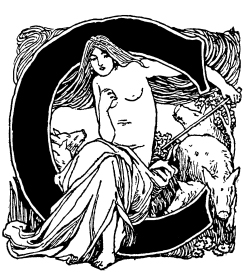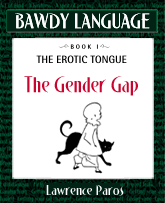Bawdy Language: Book Excerpts
As a public service, to advance the world's awareness and understanding of the origins of curse words, swear words, dirty talk, and sexual slang, and to whet your appetite for more, we offer for your pleasure a page from each chapter. These samplers provide a good sense of the subject matter of each chapter, each of which is self contained. They are cool both for reading and as a gift. Individual chapters can be downloaded at a mere $1.99 each. Such a bargain!
The Gender Gap: Book I - The Erotic Tongue
The Erotic Tongue
Haste Makes Waste: The Book of the TOILETTE


Amo, amas,
I loved a lass
And she was tall and slender;
Amas, amat,
I laid her flat
And tickled her feminine gender.
— Henry N. Cary, The Slang of Venery,
1916
The Generation Gap
Lexicographers, however, generally avoided any reference to it in their dictionaries, leaving a long-standing gap in the language. Francis Grose's Dictionary of the Vulgar Tongue met it halfway and awarded it four stars, ****, in his second edition in 1788, noting that the word came from the Greek kovvos ("bead" or "trinket") and the Latin cunnus. Then, adding insult to injury, he referred to it as "a nasty name for a nasty thing." Now really! For years, she was denied access to the OED. Only Partridge argued the injustice of her exclusion: "OED gave prick, why this further insult to women?" It wasn't until 1976 that it was finally given an entry of its own.
But even in its formal absence it has occupied a very special place in the English language. Not just "a bawdy monosyllable such as boys write upon walls" (Farmer and Henley) but the venerable monosyllable (pre-1788 — pre-1915).
As Grose reminds us, there may be thousands of monosyllables in the English language, but there is only one that is the definite article (18thC).
You Don't Say
However positive and reinforcing it could be, cunt has been a pejorative for women all the way back to the Roman times and the cunnus. According to Partridge, the word was used frequently by soldiers during World War I in such expressions as "You silly (or great) cunt." More recently, Dustin Hoffman called it to our attention while promoting his movie "Tootsie," in which he plays a man playing a woman. Displaying his newly raised consciousness on matters sexual, he noted, "If a man is obsessed with getting things right, he's called difficult. If I were a woman, I'd be called a cunt."
It's not unusual to insult people by identifying them with their body parts. Calling someone a prick is a commonplace insult, but we reserve use of the expression for males of a particular character, and not for men in general. Cunt, on the other hand, is not only a term filled with contempt and disdain, but it is applied indiscriminately, regardless of the person's character, insulting not only the person toward whom the remark is aimed, but all women everywhere.
55

